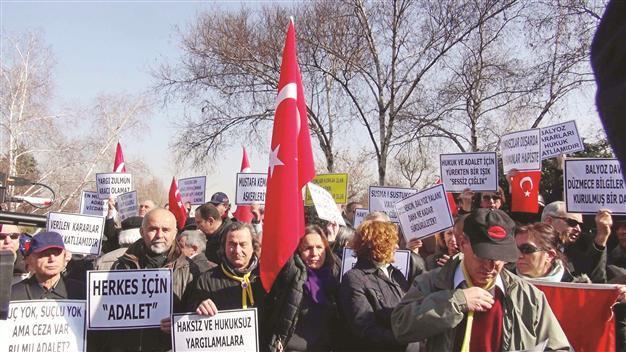Judicial package fails to get opposition’s support
ANKARA

Supporters of jailed military officials in the Balyoz (Sledgehammer) coup plot case hold a protest, holding placards that reads ‘Justice for everyone.’ CİHAN photo
A much-debated “democratization package” of reforms has failed to get full support from the main opposition Republican People’s Party (CHP), which labeled the package a “cache for hiding the government’s dirty laundry.”The package, which was presented to Parliament on Feb. 6, includes the abolition of the controversial specially authorized courts (ÖYM), a move expected to clear the way for hundreds of military officers jailed for coup plotting to be retried. Under the amendments, the eight ÖYMs that convicted soldiers in mass trials in 2012 and 2013 will be abolished and their case files passed to regular criminal courts.
The CHP has long criticized the ÖYMs, but on Feb. 6 the party’s deputy parliamentary group chair, Akif Hamzaçebi, stated that repealing them was not enough.
“We don’t definitively accept this package, apart from a few positive arrangements in it. It is understood that the government has hidden a vast amount of its dirty laundry, by saying things like, ‘I am lifting the 10-years-long detention duration, I am abolishing the Specially Authorized Courts [ÖYMs],’” Hamzaçebi said.
The CHP supports the abolition of the ÖYMs as well as of Article 10 of the Anti-Terror Law (TMK) that authorizes the ÖYMs, but other articles are impossible to support, he added.
“There is no arrangement about the duration of detention,” Hamzaçebi said. “The five-year long detention duration in the Code on Criminal Procedure [CMK] is in no way being interfered with [in the package],” said Hamzaçebi, recalling that the Constitutional Court had ruled that detention periods lasting almost five years, in the cases of now-released CHP deputies Mustafa Balbay and Mehmet Haberal, were in violation of the Article 19 of the Constitution, which covers the right to liberty and security.
“This is obvious. The Constitutional Court regards almost five-year-long detention periods as a human rights violation. In a country where the Constitutional Court’s ruling is such, saying ‘I am abolishing 10-year-long detention durations,’ is not a democratic step,” Hamzaçebi maintained, adding that the package did not include any element that would pave the way for retrials either.
Limiting court-ordered phone surveillance
According to the package, law enforcement officers will have to openly declare the owner of the line that they want to tap, while requesting permission for wiretapping.
The duration for wiretapping is also lowered from six months to three months. Thus, the practice of numerous extensions concerning crimes committed within the framework of activities of an organization will be ended. In such cases, a three-month-long extension, at most, will be possible.
Since a new procedure will be applied for the making of decisions about wiretapping, the assignment of secret investigators and technical surveillance, in order for earlier decisions made concerning such practices to remain valid, it will be obligatory to obtain a new decision within 15 days.
















